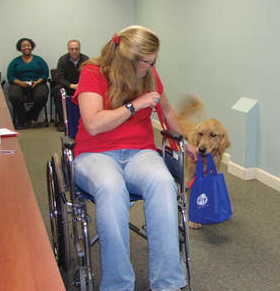Blog post by SwedelsonGottlieb, California Community Association Attorneys
 Many of our clients have been confronted with issues relating to service and companion animals at homeowners associations. Typically, the question is whether those animals are permitted to remain at the association (typically condo or stock cooperative associations) even if this would be a violation of their association’s governing documents (and generally, they are).
Many of our clients have been confronted with issues relating to service and companion animals at homeowners associations. Typically, the question is whether those animals are permitted to remain at the association (typically condo or stock cooperative associations) even if this would be a violation of their association’s governing documents (and generally, they are).
What often confuses many board members and managers is the distinction between a service animal and a companion animal. A service animal is an animal that is trained to perform tasks for a person with a physical disability, such as visual impairment or mobility issues. A companion animal, on the other hand, is an animal that provides emotional support to a person with a psychiatric disability, such as depression or post-traumatic stress disorder; companion animals are generally not specially trained or considered physical aids, nor do they need to be registered as a service animal.
In 2011, revisions to the Americans with Disabilities Act (ADA) were implemented which limit the definition of service animals only to dogs (which is interesting, as some disabled persons prefer to use other animals such as miniature horses). These revisions also include new provisions requiring that service animals be leashed or harnessed in public except when performing work or tasks for their handler that require those animals to be unleashed or unharnessed, and exempt service animals from breed bans and size and weight limitations. The preambles to these new rules also state that emotional support (companion) animals do not qualify as service animals under the ADA.
These new ADA service animal regulations (and the ADA in general) apply to state and local government services, public accommodations and commercial facilities, such as schools, restaurants, parks, places of worship, office buildings and shopping malls. As the ADA does not generally apply to common interest developments (unless a homeowners association opens its development to the public, such as for public swimming use, rental of clubhouse facilities or tennis lessons; follow this link to an article on this issue), these new service animal regulations will likely not have a direct or immediate impact on the majority of homeowners associations.
However, associations are subject to state and federal fair housing requirements related to service animals. Fair housing laws currently do not limit the definition of service animals to dogs, and essentially require associations to make reasonable accommodations for companion animals in the same manner as for service animals. These fair housing laws apply to an association’s development, irrespective of more stringent ADA requirements.
When dealing with service and companion animal issues, it is always advisable for an association’s board of directors to confer with association legal counsel regarding those issues before making any decisions or taking any action related to same. Failure of a board/association to properly address reasonable accommodation requests can place the board/association at risk for various legal claims by the member/owner asking for the reasonable accommodation, and potential governmental penalties.
 HOA Law Blog
HOA Law Blog


